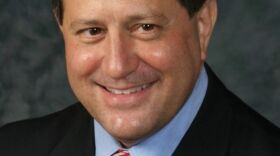U.S. Attorney Preet Bharara of New York’s Southern District returned to Albany Thursday for the first time since his office announced charges against several high-profile New York officials and developers last month. Bharara, whose office also successfully prosecuted former state Assembly Speaker Sheldon Silver and Senate Majority Leader Dean Skelos on corruption charges, spoke at an evening forum at the College of St. Rose.
The crowd was obviously there to see and hear Bharara, who was in a jovial mood: "A very warm welcome I got, which must mean that there are no politicians in the audience. I also want to let people know I wear no watch, and I bought my own suit."
From there, it was down to business: "Most of the time the cases that we have brought, the bread and butter of the public corruption cases we have brought have been about bribery and been about kickbacks and been about quid pro quos."
Bharara expressed confidence that the various corruption convictions of the likes of Sheldon Silver and Dean Skelos will be upheld, despite a U.S. Supreme Court decision that narrowed the law they were found guilty of breaking. "We think that beyond question, that the kinds of things that we alleged and proved in both of those cases and in other cases that were being challenged now were squarely within what the McDonnell opinion said was still a violation. Now, the legal question will be, well, was there harm done to the defendant because of the instruction given was different from what McDonnell says now the legal instruction should be. So even if it's the case that the thrust of our prosecution was did wither Sheldon Silver or Dean Skelos engage in core function exercise of governmental power like giving grants or passing legislation or introducing legislation, that's a far cry from having a meeting or engaging in constituent services, and even though that's the thrust of what we argued, the defense argument is, and will be, the instruction to the jury was something that McDonnell said was too expensive. We had an argument about that too and I don't want to get bogged down in it. But it may have been the case there were also meetings that occurred and McDonnell says meetings are not enough. Our argument throughout trial was about other things, but in our view that could be mucked up a little bit because of these decisions. We think if the McDonnell decision and its clarity had been enunciated before we had done the trials of Silver and Skelos there would be no question, because the judge would have been very careful to track very carefully the language in McDonnell, which is new, and we would have been, the prosecutors would have been very, very careful, I think we were, but we would have been even more careful about making sure the arguments we made in summation and rebuttal, completely conformed with what was announced in McDonnell."
Citing the first tenet of the code of ethics of the society of professional journalists: "Seek the truth, and report it as fully as possible," panelist Times Union editor Rex Smith credited reporters with exposing questionable tactics that lead to ethics and corruption investigations. "If you're gonna report it fully, as the code of ethics says, it means not just saying 'this is what the governor says,' but actually fact-checking and actually looking beyond and deeper. And I would point out that sometimes we don't manage to do that effectively. There are those sins of omission and commission on the part of the press. There are some, fewer than people may expect, but there are some bad players in the media, primarily employed by a tabloid in New York City, but generally our problems are sins of omission, that is, the things that we fail to do, the extra phone call we fail to make, the door we fail to knock on. Also however, one of the things that I need to point out is that we do not have subpoena power, so our reporting may point the way, whereas we really need cases to come forward from the legal system when there is corruption."
Although he didn’t speak with reporters afterward, Bharara tipped his hat to the press, explaining his office began looking into bid-rigging cases after seeing reports. He noted that because people place their trust in public officials, those who serve should be held to a higher standard, and believes "no one is above the law."











